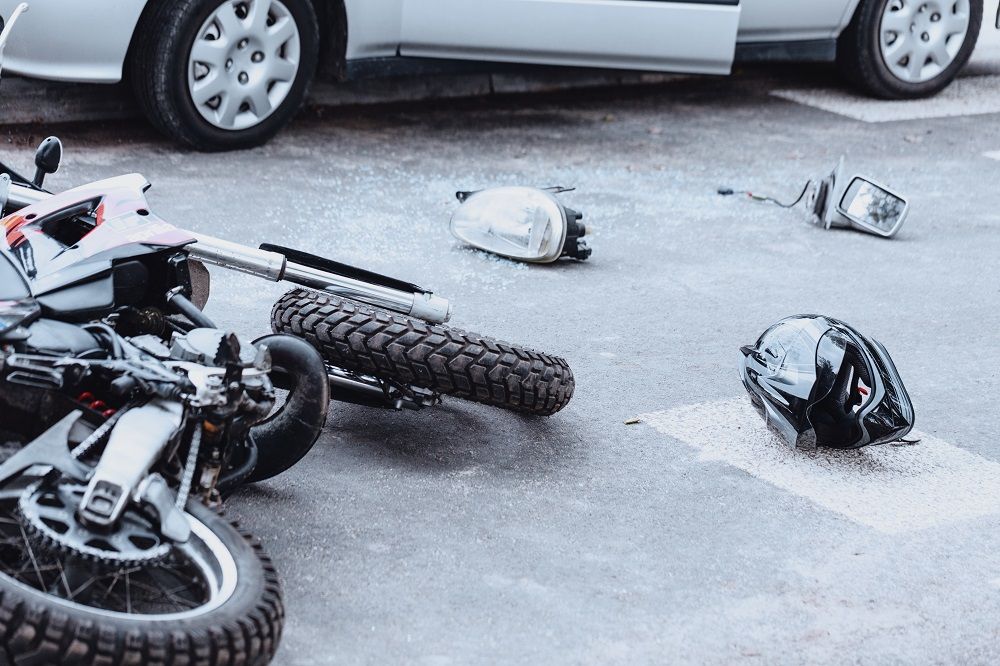What You Should Know about Georgia's Mandatory Helmet Law

When a motorcycle accident occurs, the most significant threat to the motorcyclist is the lack of protection afforded by an enclosure. In 2016, that lack of protection led to a fatality rate 28 times higher than vehicle accidents not involving motorcycles. Because of that, many states have some form of motorcycle helmet law. Here's all you need to know about Georgia's motorcycle helmet law.
The Problem
Each year, according to the National Highway Traffic Safety Administration, motorcycle accidents cause more than 5,000 fatalities and thousands of additional injuries. For people not wearing a helmet, the head becomes the most vulnerable part of the body and being involved in a motorcycle accident without a helmet can lead to significant skull, brain, and neck injuries.
With that in mind, the vast majority of states have implemented helmet laws for all bike riders. Compliance requirements vary from state to state, with Georgia having some of the nation's most robust helmet laws.
The Legal Particulars
Georgia first passed a mandatory helmet law in 1969. Since then, little has changed in the law. Unlike most states that only require that riders under a certain age wear a helmet, Georgia requires all bikers, including operators and passengers, to wear a helmet when operating or riding on a motorcycle. The pertinent law in the Official Code of Georgia Annotated is Section 40-6-315.
That law states that no one should ride or operate a motorcycle unless they are wearing protective headgear, "which complies with standards established by the Commissioner of Public Safety."

Exceptions
Georgia's motorcycle helmet law does have a few exceptions. It doesn't apply to a rider in an enclosed cab or motorized cart. It also doesn't apply to an operator or rider of a three-wheeled motorcycle that is used only for agricultural purposes. Practically, what this means is that any operator or rider of a motorcycle must be wearing a helmet. There are also rules and laws pertaining to the type of helmet and headgear employed.
Helmet and Headgear Requirements
All motorcycle helmets must meet Department of Transportation helmet standards as detailed in Federal Motor Vehicle Safety Standard No. 218. Those standards set criteria for impact attenuation (basically energy absorption), penetration resistance, and system effectiveness. There are also rules on the verbiage and placement of labeling indicating DOT compliance.
In addition, motorcycle operators are required to wear DOT-approved eyewear. This includes approved helmet visors and goggles. Regular eyeglasses or visors that reduce the impact of the sun aren't approved eyewear. Helmets with internal speakers are permissible, but only for communications purposes.
Apart from being incredibly dangerous, not wearing a helmet while riding on or operating a motorcycle comes with a fine of up to $1,000 and/or up to one year in jail, plus community service. Worse, if you are in an accident, not wearing a helmet can seriously injure or kill you or your passenger.

Why are helmet laws required?
According to the National Highway Traffic Safety Administration accidents involving motorcycles represent a disproportionate amount of all traffic accident deaths. According to the Center for Disease Control and Prevention (CDC)one of the most effective ways to prevent injuries like head injuries on the motorcycle is wearing a helmet. Motorcycle injury statistics from the CDC shows that helmets reduce the risk of death by 37% and the risk of head injury by 69%. As a result, most states require motorcycle helmets by law.
Georgia motorcycle helmet law
The State of Georgia explicitly requires the use of a helmet, and in some cases, protective eyewear when riding a motorcycle. As a result, if you are a new rider or an experienced motorcyclist visiting Georgia and wondering if Georgia has a motorcycle helmet law, the simple answer is, yes.
According to Georgia motorcycle laws, the operator of a motorcycle must wear protective headgear which complies with standards established by the commissioner of public safety-which follows the federal safety requirements. Also, Georgia law specifically requires wearing eye protection when riding a motorcycle without a windshield that is also approved by the commissioner of public safety.
There are a few exceptions to these safety requirements. Riders who are within an enclosed cab or other motorized cart and operators of a three-wheeled motorcycle used only for agricultural purposes are exempt from these helmet and eyewear regulations.
What happens if I get a ticket for riding a motorcycle without a helmet?
Georgia motorcycle laws require that all motorcycle riders are to wear helmets and protective eyewear to legally operate motorcycles in the state. Riding a motorcycle without this protective equipment is a serious traffic offense that can result in either a fine, points assessed to your driver's license, jail time or all three! If found guilty of operating your motorcycle without a helmet you could receive a fine of up to $1,000 and other charges and fees depending on the county where the ticket is given.
If you are charged with riding a motorcycle without a helmet or protective eyewear, do not attempt to decipher the facts and apply the law on your own. Contact your local motorcycle lawyer to get assistance.
What happens if I am involved in an accident?
Reports show that motorcycle accidents are on the rise. As with any automobile accident, the consequences for all involved are potentially life-altering and devastating. If an accident while riding a motorcycle, the liability or fault for the accident will most likely be attributed to the negligent party. Therefore, any medical injuries or damages to the personal property of everyone involved in the accident will be the responsibility of that person. An expert familiar with the nuances of these complex issues is a great resource to consult in these situations.
As with most situations, there are exceptions, a person maybe able to reduce their liability by showing that the accident was caused by another party. This will most likely involve proving that the car that hit a motorcycle rider was changing lanes, weaving, or was distracted while operating their vehicle by either texting, changing the radio station, "rubbernecking" or some other negligent operation.
If you are in an accident contact your local motorcycle personal injury lawyer in Atlanta to get assistance. A professional familiar with the nuances of these complex issues is a great resource to consult in these situations and can help you determine damages, liability, and other factors relevant to the resolution of your matter.
